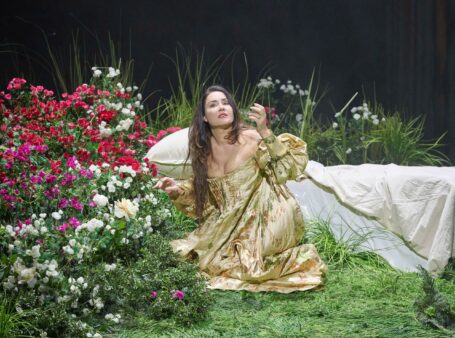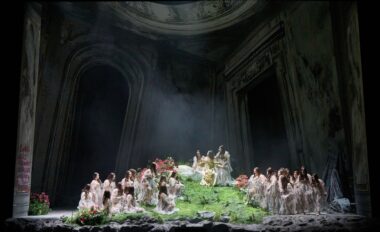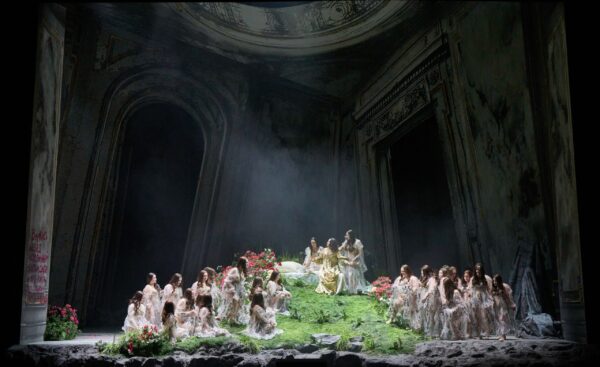 Austria Tchaikovsky, Iolanta: Soloists, Chorus and Orchestra of the Vienna State Opera / Tugan Sokhiev (conductor). Broadcast live (directed by Ella Galliani) from Vienna State Opera, 6.4.2025. (JPr)
Austria Tchaikovsky, Iolanta: Soloists, Chorus and Orchestra of the Vienna State Opera / Tugan Sokhiev (conductor). Broadcast live (directed by Ella Galliani) from Vienna State Opera, 6.4.2025. (JPr)

When Tchaikovsky’s Iolanta was first heard in 1892 in Saint Petersburg his last opera shared a double bill with the composer’s last ballet, The Nutcracker. The only other time I have heard it was when it was performed at New York’s Metropolitan Opera in 2015 with Bartók’s Bluebeard’s Castle in their stagings by Polish director Mariusz Treliński and dramaturg Piotr Gruszczyński. Treliński explained they paired them together because they could show ‘one woman in two phases of her life.’ In Vienna, even though only about 100 minutes long Iolanta was given the evening all to itself.
Before Kazakhstani Evgeny Titov’s new production (with sets by Rufus Didwiszus and in Annemarie Woods’s costumes) opened on 24 April, it had been 125 years since Iolanta had been seen and heard at Vienna’s Hofoper (now Staatsoper) conducted by – none other than – Gustav Mahler. It had nine performances with a last single one in 1901 conducted by Franz Schalk.
Iolanta is a highly-fictionalised version of the real-life fifteenth-century French princess, Yolande, Duchess of Lorraine, who is shown as having been born blind. She is kept by her father King René (through shame, guilt or her best interests?) in seclusion in a garden paradise surrounded by caring friends and attendants who never reveal that there is such a thing as sight. Her blindness is cured by Ibn-Hakia, a Moorish physician, and this healing is helped by the love of Count Vaudémont and her inner desire to see. He first arrives at the king’s estate with Robert, Duke of Burgundy, who has been betrothed since he was young to Iolanta and the king does not want Robert to discover her condition. However, Robert tells Vaudémont that he has fallen in love with Countess Mathilda and wants to get out of the arrangement. Cue fairy-tale happy ending because having breached a garden wall Vaudémont and Iolanta have fallen in love and -while the path to true love never ever runs smooth in stories like this – eventually the king agrees to their marriage. Ibn-Hakia’s treatment having worked Iolanta rejoices – only up to a point for director Titov (see later) – in the magical new world open to her as the court celebrates in a stunningly upbeat and rousing climax.
What had passed me by the first time I saw Iolanta was all the praying and praising of God there is. I am not sure how much of a believer Tchaikovsky was; however, important to this work – and worthy of perhaps more debate – is the composer’s fascination with Wagner. The mournful opening cor anglais solo is from Tristan und Isolde Act III with the Scene 3 celebration of light for Iolanta and Vaudémont clearly Tchaikovsky’s version of that opera’s second act love duet. Also, as the prelude proceeds you will not fail to hear the Bacchanale from Tannhäuser.

Eventually it becomes obvious (possibly too early?) that we are in a somewhat derelict and gloomy atrium or grand hall with huge doors to either side. However, at the centre is a grassy knoll surrounded by rose bushes with a small pond to the front. Compared to what you can make out at the back this is a riot of colour. Iolanta is in a barely-there covering – think Bianca Censori at this year’s Grammys – and is bathing Botticelli-like before dressing. She is surrounded by a vast number of lookalikes with similar dark hair (later shown to be wigs) and in white gauzy floral creations, though Iolanta is in a gold one. Many of the other characters we see will be dressed in sombre colours, often black, including Marta, Iolanta’s carer. Marta’s lank-haired, axe-wielding husband Bertrand – who looks like a majordomo who has fallen on hard times and reminds me of Alberich – injects the swooning Iolanta during a lullaby begun by her friends Brigitta and Laura. Iolanta is lain asleep on a couch atop the grassy bank. For some reason all the Iolantas put on yellow plastic macs before withdrawing.
Betrand warns Alméric not to mention light to Iolanta; he has arrived – looking like a rough sleeper – to advise of the king’s imminent arrival. The doctor Ibn-Hakia – in a blue plastic raincoat – is dragged in by two oiled, bare-chested bodybuilders often present from then on as (sort-of) security guards. Ibn-Hakia applies an electrode to Iolanta’s forehead and monitors the results on a laptop.
Vaudémont and Robert enter ignoring some graffiti apparently warning ‘Turn back! Whoever enter here is dead’. Robert dips his feet into the pond and sings the praises of his true love ‘Who may compare with my Mathilde’ while Vaudémont is already infatuated with Iolanta singing ‘Oh come, you radiant angel’ and both wonderful arias gained ovations for Boris Pinkhasovich and Dmytro Popov, respectively). Before leaving to gather troops to rescue Vaudémont he discovers some concealed jewellery and gold in a chest. Iolanta awakes and the pair fall in love over a glass of wine despite her confusion over red and white roses which makes Vaudémont realise she cannot see. Cue that voice-shredding Tristanesque scene which ends with the kiss we all anticipated. Robert returns with his beloved Mathilde (a veiled half-naked female bodybuilder) ‘riding’ on the huge carcass of a slain bull (why?).
Some mistaken identities are cleared up (Vaudémont did not know that René was the king for instance); the king condemns Vaudémont to death for revealing to Iolanta she is blind before saying it was all pretence in order to get her cured; and Robert is released from his marriage contract to Iolanta. She can now see and is united with Vaudémont with a paean from all concerned to the ‘Good, great and eternal god’ and concluding with ‘Hosanna in the highest!’ Literally the veil falls from Iolanta’s eyes and – avoiding completely spoiling the ending – when the real world is revealed Iolanta will shut her eyes once more.
It is an intriguing production, though – as you can gather – with some oddities, although it does provide an excellent showcase for Vienna’s exceptional cast (unimaginable in London) to excel in a sequence of arias, duets and larger ensemble moments; and I doubt any director could really spoil the opera. It also highlights Tchaikovsky’s subtle, moody, evocative and sensuous score, splendidly played by the Orchestra of Vienna State Opera under Tugan Sokhiev’s richly expressive conducting. The splendid chorus acted with commitment and sang with discipline and enthusiasm.
Boris Pinkhasovich sang fervently as the avaricious, swaggering Robert and his baritone voice reveals impeccable phrasing, a great range of colours and considerable heft. Dmytro Popov was an attractively sung Vaudémont, the tessitura of role is fearsome, requiring the power of a heroic tenor and the ability to rise to a delicately floated high note such as at the end of the Scene 3 ‘Romance’ aria. As Iolanta’s father, René, Ivo Stanchev’s imposing bass voice had cavernous depths and a noble tone, Monika Bohinec (Marta), Simonas Strazdas (Bertrand), Daniel Jenz (Alméric), Maria Nazarova (Brigitta) and Daria Sushkova (Laura) are not given much to sing by Tchaikovsky, but they were impressive vignettes nonetheless. Whilst Attila Mokus brought gravitas to Ibn-Hakia’s pronouncements.
Finally, Sonya Yoncheva was outstanding as a richly-sung and deeply- touching Iolanta; her majestic soprano voice fully encompassed the character’s range of emotions from naivety and wistful yearning, followed by despair at her plight, to burgeoning passion and culminating in Iolanta’s final rapturous moments …even if these are rather undercut by Titov’s production.
Jim Pritchard
Creatives:
Production – Evgeny Titov
Sets – Rufus Didwiszus
Costumes – Annemarie Woods
Costume collaboration – Selina Tholl
Lighting – Martin Gebhardt
Choreography – Otto Pichler
Chorus master – Thomas Lang
Cast:
Iolanta – Sonya Yoncheva
Vaudémont – Dmytro Popov
Duke Robert – Boris Pinkhasovich
King René – Ivo Stanchev
Ibn-Hakia – Attila Mokus
Alméric – Daniel Jenz
Bertrand – Simonas Strazdas
Marta – Monika Bohinec
Brigitta – Maria Nazarova
Laura – Daria Sushkova
